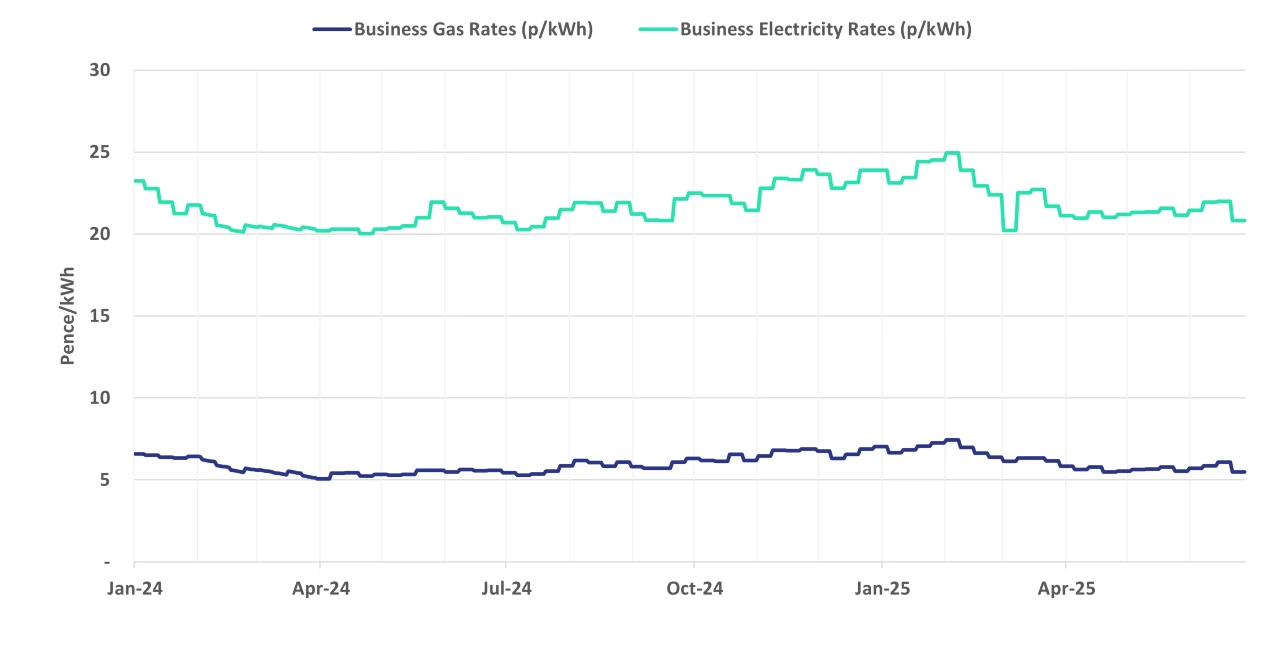Business Energy Comparison
Compare July 2025 Energy Rates and Save up to 45% Today
Just enter your business postcode…
Compare July 2025 Energy Rates and Save up to 45% Today
Just enter your business postcode…
Comparing business energy prices with our UK-based experts is simple. Here’s how our comparison service works:

Provide us with some basic information about your business, and we’ll quickly search the market for the best prices.

Our experts present the fixed quotes tailored to your business and are available to discuss and advise on the best options.

If you decide to proceed with one of our quotes, we’ll manage the switching process to ensure a smooth transition to your new tariff.
Over 100 energy suppliers compete in the market to offer the best business energy tariffs. Use our business energy comparison service to quickly find the best deals and benefit from:

Save thousands by accessing the most competitive business energy prices.

Access trusted UK-based suppliers known for excellent customer service.

Avoid expensive out-of-contract rates by switching to a fixed energy tariff.
When comparing business energy suppliers, the key factors to consider are the quoted price and the best business energy supplier reviews.
Here are a few other factors that you’ll want to consider when comparing business energy suppliers:

Understand whether you are committing to receiving energy at a fixed or variable rate per kWh. In a variable tariff, your price may go up or down as market conditions change.

The typical fixed-rate energy tariff lasts between 1 and 3 years. During this period you’ll receive energy at the agreed rate unless you move out of the property.

Most commercial energy contracts come with a business energy standing charge that you’ll pay each day of the contract, regardless of whether your business uses any energy.

Most suppliers require small businesses to settle monthly energy bills using direct debit. If your business needs more flexibility, it’s important to agree on this upfront.

In renewable business energy, your supplier will commit to using only green energy sources such as wind and solar. Standard tariffs will use a mix of sources, including fossil fuels.

All business energy contracts specify what will happen at the end of the fixed term if no new arrangements are made. Usually, it’s a rollover fixed tariff or a standard variable tariff.
The table below shows the average one-year fixed rate available through our business energy comparison service over the past week.
| Size | Annual Consumption kWh | 1 Year fixed gas rate p/kWh | 1 Year fixed elec rate p/kWh |
|---|---|---|---|
| Small | 10,000 to 50,000 | 6.0 | 22.8 |
| Medium | 50,000 to 100,000 | 5.5 | 20.8 |
| Large | 100,000 + | 5.3 | 20.6 |
Important Note: The information above does not represent live energy prices. Business energy rates change daily and vary by location. To view the rates available to your business today, start by entering your postcode above.
Source: The above data has been compiled using the following:
Business energy rates have significantly fallen since the peak of the energy crisis in Autumn 2022. Business energy suppliers are now offering substantial discounts on their one-year fixed tariffs. Discover how much your business can save today when you compare commercial energy prices.

Source: Wholesale energy rates on the National Grid published on the ICE exchange.
In response to the energy crisis, the government introduced two schemes to support UK businesses:
💡Both government support schemes have now concluded and have not been extended.
With the absence of government support, securing competitive energy rates from the market has become crucial.
Compare business energy rates today with AquaSwitch.
Understanding what influences your business energy costs can help you make better decisions when you compare business energy; here’s what to consider when you compare business energy:
At AquaSwitch, our business energy experts have worked hard to create the following tools and guides to help business owners better understand the world of business energy.

Calculate your monthly business electricity bill by entering a few details about your tariff with our business electricity rates calculator.

Use our simple business energy audit checklist to identify ways to reduce electricity and gas consumption.

Calculate your monthly business gas bill by entering a few details about your tariff with our business gas rates calculator.

Use our business energy consumption guide to identify which devices in your business consume the most energy.

Please refer to our business energy contracts guide to understand the crucial legal terms and conditions in your energy tariff.
At AquaSwitch, our business energy experts have developed strong, long-lasting relationships with over 27 business energy suppliers. This extensive network and deep industry expertise allow them to secure competitive business energy deals.
Our experts have assisted over 90,000 businesses in reducing energy costs and navigating industry complexities.
In this section, we address some frequently asked questions about our business energy comparison service.
Business energy suppliers carefully manage credit risk when onboarding new customers.
Suppliers use different approaches to assess the credit scores of new customers, and it’s common for them to adjust pricing to account for the credit risk associated with a contract.
Suppliers may require a security deposit or mandate bill settlement by direct debit to reduce their exposure to credit risk when onboarding new customers with a lower credit score.
When comparing business energy quotes with AquaSwitch, you’ll need to sign a Letter of Authority (LOA) to authorise our experts to negotiate the best energy rates and manage the switching process on your behalf.
You can use our business energy comparison tool to view the latest prices, but if you decide to proceed with one of our quotes, you will need to sign an LOA.
Unfortunately, prices fluctuate due to the dynamic nature of the energy market. If you receive a business energy comparison report today and decide to proceed with a quote two days later, prices will likely have changed.
We recommend carefully reviewing your energy quotes on the day you receive them to ensure you can secure the rate our business energy experts have presented.
You may cancel a business energy contract immediately without incurring costly exit charges in the following scenarios:
Check out our complete guide to cancelling a business energy contract for more information.
You can only switch business energy to a new contract the day after your current contract’s end date.
It’s important to note that it may take up to 4 weeks for a new supplier to take over your supply. If your contract end date is less than four weeks away, you may end up on out-of-contract rates while awaiting the transfer of your supply.
There are some exceptions to this:
If you check your recent business energy bill, it will usually state the end date of your current contract. If not, we recommend reviewing your original agreement or contacting your supplier’s customer service team.
Knowing when your business energy contract ends is essential. If you haven’t arranged a new contract, you’ll automatically start paying unnecessarily high deemed standard variable rates.
Our energy experts have helped businesses save thousands on energy rates by switching to the most competitive deals. If you haven’t switched suppliers in a while, you may be paying unnecessarily high business energy rates.
Regardless of your situation, with our business energy comparison service, we’ll quickly let you know how much you can save.
Our energy experts recognise that every business has unique needs. They have assisted businesses of all sizes, from small enterprises to large corporations, in finding better energy deals. Regardless of your business size, we always go the extra mile.
Here, we outline the bespoke approach we take to business energy comparison for different types of companies:
Energy comparisons for large businesses require bespoke quotes, which can take a little longer to arrange but address specific needs such as:
Despite the additional steps, our experts are dedicated to supporting you throughout the comparison process for large business energy.
Business energy is a significant overhead for most small businesses, so reducing your unit rate by even the slightest margin will help you save money.
The regular Ofgem gives additional rights to smaller businesses to make it easier to compare business energy prices and avoid expensive deemed contracts.
For these businesses, a commercial energy supplier must:
Business energy suppliers offer simple fixed tariffs for smaller businesses to help you quickly and easily reduce energy bills. For more information, check out our guide to small business energy.
Renewable energy for businesses is getting cheaper each year as green technologies improve. The additional cost of a green energy tariff is getting ever closer to the price of a standard business energy tariff.
A few of the biggest energy suppliers now provide renewable energy as standard in their small business tariffs.
Enter your details using our business energy price comparison tool to get the latest renewable energy prices. Our business energy experts will automatically collect quotes from green energy suppliers for you to compare.